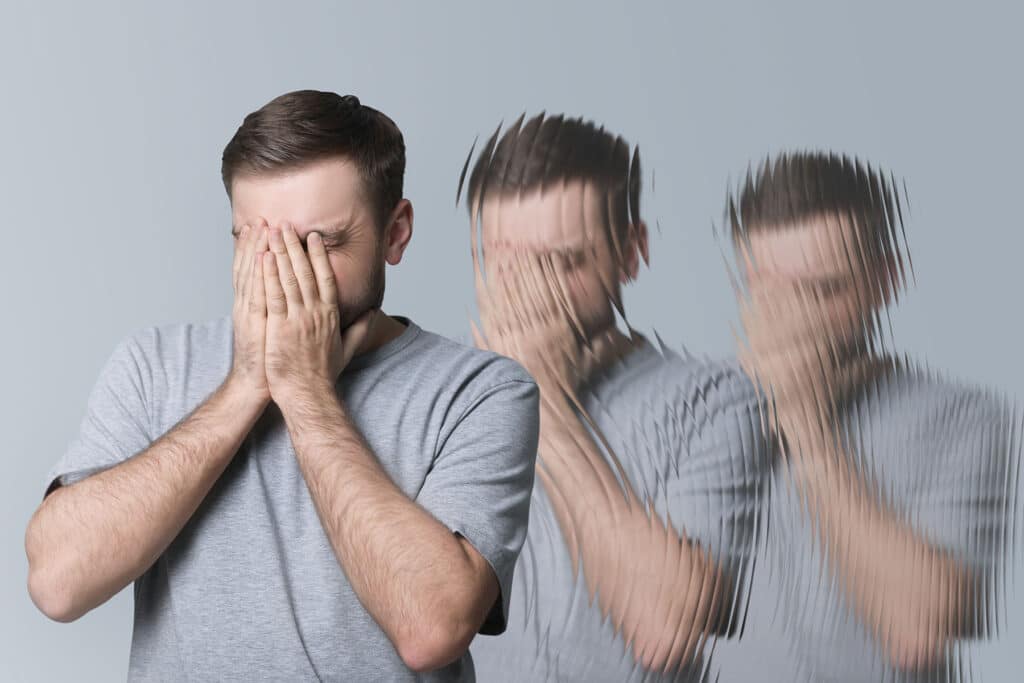If you’re affected by alcoholism, alcohol detox and rehab are essential elements of your recovery. During detox, you stop drinking and allow your body to flush itself of toxins. When this happens, some people develop significant complications, including detox hallucinations during alcohol withdrawal. These hallucinations may be related to delirium tremens (DTs). They may also be associated with a different complication called alcoholic hallucinosis. If you experience DTs or hallucinosis, your detox team will provide treatment that helps you cope with their effects. This treatment makes it possible for you to take the next steps in your recovery.
Contact 888.231.1281 to learn more about alcohol detox and rehab at Northpoint Colorado.
Delirium Tremens and Detox Hallucinations
Delirium tremens is a severe complication of alcohol withdrawal. Most people going through withdrawal will not experience it. However, it may occur if you’re affected by factors such as:
- An extensive history of drinking heavily
- Multiple experiences with alcohol withdrawal
- Heavy, daily use of any form of alcohol in the months before you quit
Visual and touch-based hallucinations are just some of the symptoms that can affect people with DTs. One of the hallmarks of the condition is delirium. This term describes a sudden and severe state of confusion that can worsen over time. Other common symptoms of the DTs include:
- Rapid changes in your mood
- Muscle tremors
- Increased irritability and agitation
- Restlessness
- Bouts of fear or excitement
- Unusually sensitive eyesight, hearing, or touch
You may also experience seizures. The overall effects of the DTs are potentially life-threatening. For this reason, doctors universally view the condition as a medical emergency.
Detox Hallucinations and Alcohol Withdrawal
Alcoholic hallucinosis can occur when you’re withdrawing from alcohol. However, you can also experience these kinds of hallucinations after drinking heavily. In addition to hallucinations, you may experience paranoia and a heightened sense of fear.
Most affected people have sound-related hallucinations. These sounds usually take the form of voices. The voices you hear in this state often make commands. In addition, they may make spiteful or hateful comments. Apart from these sound-based changes, you may be in a perfectly normal conscious state. However, hallucinosis can also produce visual or touch-based hallucinations.
There is no single answer to how long alcoholic hallucinosis lasts. When alcohol use stops, most people recover in a matter of months. However, one or two out of every ten affected people will have longer-term symptoms.
Coping with Hallucinations in Detox
Treatment for hallucinations depends on the source of your symptoms. For this reason, treatment starts with a proper diagnosis of the DTs or hallucinosis.
The first goal of treating the DTs is stabilizing your condition. Next comes help for your symptoms. Many people with the DTs need the calming effects of sedatives. You may also need anti-seizure or anti-anxiety medications. Treatment for DTs often takes place in a hospital.
To cope with hallucinosis, you may need antipsychotic medication. Your treatment plan may also include a sedative. Some people affected by the condition need to be physically restrained to prevent injury and may need to be monitored for suicidal behavior.
Alcohol Detox, Hallucination, and Treatment
Alcohol withdrawal and detox can pose significant challenges, and it is essential to understand the complete picture. Detox hallucinations and alcohol withdrawal delirium are common yet severe complications that require immediate medical attention. The symptoms can be unnerving and alarming, but remember, you are not alone in this journey. There are numerous treatments available that can help manage these symptoms and aid in your recovery.
- Medical detoxification — Detox in a medical setting ensures that withdrawal symptoms, including hallucinations, are managed under the supervision of healthcare professionals. These professionals can intervene quickly if complications arise.
- Medication — Drugs such as antipsychotics, sedatives, anti-seizure, or anti-anxiety medications are often part of the treatment plan to manage hallucinations and delirium.
- Psychotherapy — Cognitive-behavioral therapy can help manage paranoia and fear associated with hallucinations.
- Support groups — Connecting with others who are going through similar experiences can provide emotional support and practical insights during the recovery process.
Alcohol detox and recovery are not easy paths, but taking the first step is crucial. Remember, it’s okay to ask for help, and it’s okay to lean on others as you navigate the road to recovery. The journey may be challenging, but with proper medical and emotional support, a life free from alcohol and its detrimental effects is entirely attainable.
Turn to Northpoint Colorado for More Information on Detox Hallucinations
Are you ready to stop drinking and take the first steps to sobriety? Talk to the addiction specialists at Northpoint Colorado. There is a chance you may suffer from alcoholic hallucinosis the next time you try to stop drinking. There’s also a good chance that you need alcohol addiction treatment.
At Northpoint, we specialize in this kind of treatment. We provide vital support that helps you safely make it through the detox process. That includes prompt, expert care for any detox emergencies. Call us today at 888.231.1281 or fill out our online form to learn more about our alcohol detox program.




